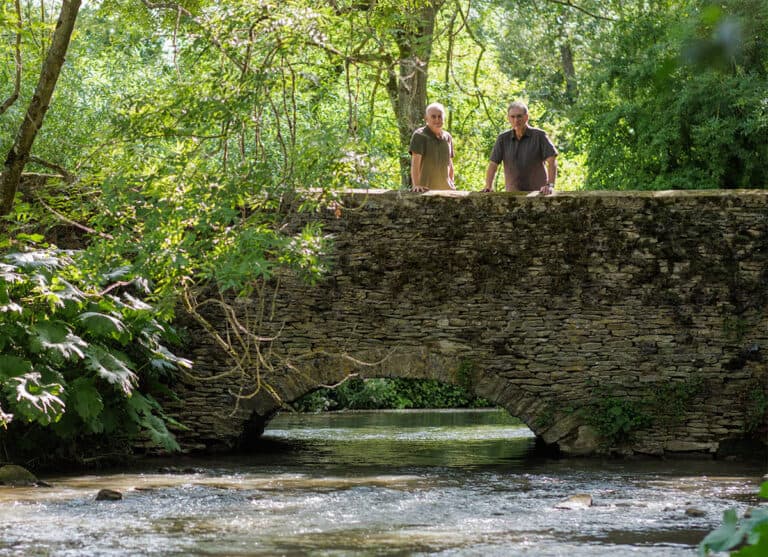Ashley Smith and Peter Hammond by the River Windrush in Oxfordshire. Photograph: Sam Frost/The Guardian
A tide of effluent, broken laws and ruthless cuts is devastating the nation’s waterways. An academic and a detective have dredged up the truth of how it was allowed to happen – but will anything be done?
Peter Hammond’s house is so picture-perfect – honey-gold stone, scarlet postbox by the door, pink roses climbing towards the first-floor windows – that it could host a murder in a detective drama. It is a converted mill, and the garden is long, narrow and exuberant, with water on both sides. To the south is the millrace that once drove the stones that ground the corn; to the north is the River Windrush, which runs through Gloucestershire and Oxfordshire on its way to join the Thames.
Hammond, a retired professor specialising in machine learning, arrived here two decades ago, and delighted in the variety of wildlife he could see in his garden: voles, otters, deer, foxes, badgers, grass snakes, lizards, swans and ducks, as well as chub, barbel and grayling swimming among the long fronds of the water-crowfoot as it swayed over the gravel beds. Kingfishers perched in the willows. It was only in 2013, when he gained a new neighbour – a keen angler and retired detective superintendent called Ashley Smith – that he realised something was wrong with his Cotswolds paradise.
“It took a fisherman’s eye to see it was so bad,” said Hammond, who has steel-grey hair and a determined jaw, as we walked through his garden recently. Every year the river had got worse, but so gradually that he hadn’t noticed it. “It’s like how you don’t notice yourself getting older, then a friend sees you and says: ‘My God, you’ve got old.’”

Smith remembers the two of them leaning on the bridge rail and looking for fish swimming up to spawn in the gravel. That first year, he saw five barbel and two chub. By 2014, the chub had gone, and he saw just three barbel. And that was that. “I haven’t seen a fish since,” he told me.
By now, anyone leaning on that rail wouldn’t see a fish even if it existed: the River Windrush is opaque, its once-clear water running khaki-grey. Where the gravel beds were golden, they are now mired in scum. It’s not just the fish that have vanished, so have the crowfoot plants. “We used to get swans breeding on the little island near our bridge, but they’re gone,” said Hammond. “There’s nothing for them to eat any more.”
Until recently, the story we told ourselves about Britain’s rivers was one of recovery and rebirth. During the Industrial Revolution, the country used rivers as a waste-disposal mechanism, and they died by the score. But, after the second world war, industries were obliged to be more careful, and water companies were forced to clean up sewage. Gradually, life returned. Thanks to decades of careful and laborious work, salmon returned to the Thames and trout to the Taff.
But in the past couple of decades, that progress has flatlined. It is not just Hammond and Smith who are alarmed about their local river: so are anglers, swimmers, canoeists and naturalists all over the country. And it is not just urban rivers that are in trouble. Even rural rivers that stayed pristine throughout the years of heavy industry are suffering now.
I live near the River Wye, which rises in Wales before crossing into England. As a boy in the 1980s, I swam past vast swarms of mayfly and huge leaping salmon. I have seen nothing like that for years. Farther south in Wales, the River Usk is, according to a recent report, “degraded and deteriorating”, with trout stocks at their lowest on record. And if the situation is bad in Wales, where less than half of rivers are classed as having “good status” by the government’s own standards, it is worse in England. Barely a seventh of English rivers achieve that level.
“Some of our best loved and most iconic wildlife face a perilous future. We must act now to ensure that generations to come can marvel in the joys that our freshwater habitats can provide, from the magical sight of otters playing in […]
Full article: www.theguardian.com

